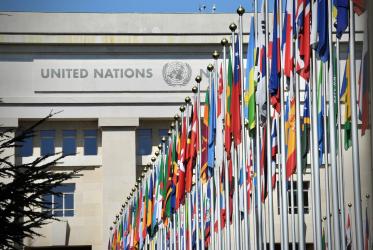Is religion discriminating? Does there exist discrimination within and by different religions? World Council of Churches (WCC) general secretary Rev. Dr Olav Fykse Tveit explored these questions with fellow panelists during a conference at a cultural center in Trondheim, Norway on 14 February.
“Discrimination is all about justice, and justice must be expressed in rights," said Tveit. “Rights belong to structures of accountability; universal human rights are what the national states should implement in their legislation and systems of justice. Rights are defined in international conventions and agreements.”
When we connect these definitions with religion, we add many dimensions to the discussion, he continued. “Particularly we add basic questions to the dimension of accountability: What does it mean that we are accountable to God when we discuss religion and discrimination? My answer is, it means a lot, what we mean by moral accountability and even legal accountability.”
Tveit spoke about religion and discrimination as it relates to the WCC’s current pilgrimage of justice and peace.
“To establish justice and peace is to a large extent to address all forms of discrimination," he said. “Being accountable to God, to the living God and the creator of all, is to be accountable to the living of today. Particularly - and first and foremost - we are accountable to other human beings, all of whom are created in the image of God. To be a human being is to be ‘the fellow human being’, always relating to the others, even the unknown and the stranger.”
Ultimately, he noted, considering religion and discrimination requires asking difficult but vital questions: “What can bring hope for human beings for tomorrow? Is religion something we use to secure our own future, to safeguard the reproduction of our clan, our group, our nation only, or is it a basis and an inspiration for what we can call the future of humanity?”
Tveit was part of a plenary session addressing the topic of religion and discrimination. The speakers told their own stories and experiences from different parts of the world and religions, then took part in a discussion.
Other speakers included Marina Nemat, a Christian refugee from Iran, and Dr Ismail Cuneyt Guzey, who is associate professor of the Department of Neuroscience and Movement Science at the Norwegian University of Science and Technology (NTNU) as well as leader of the Muslim Society in Trondheim.
Ulrika Mårtensson, professor of the NTNU Department of Philosophy and Religious Studies, moderated the session.






